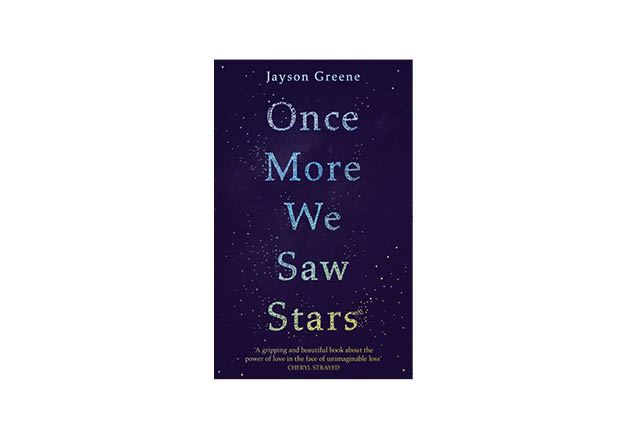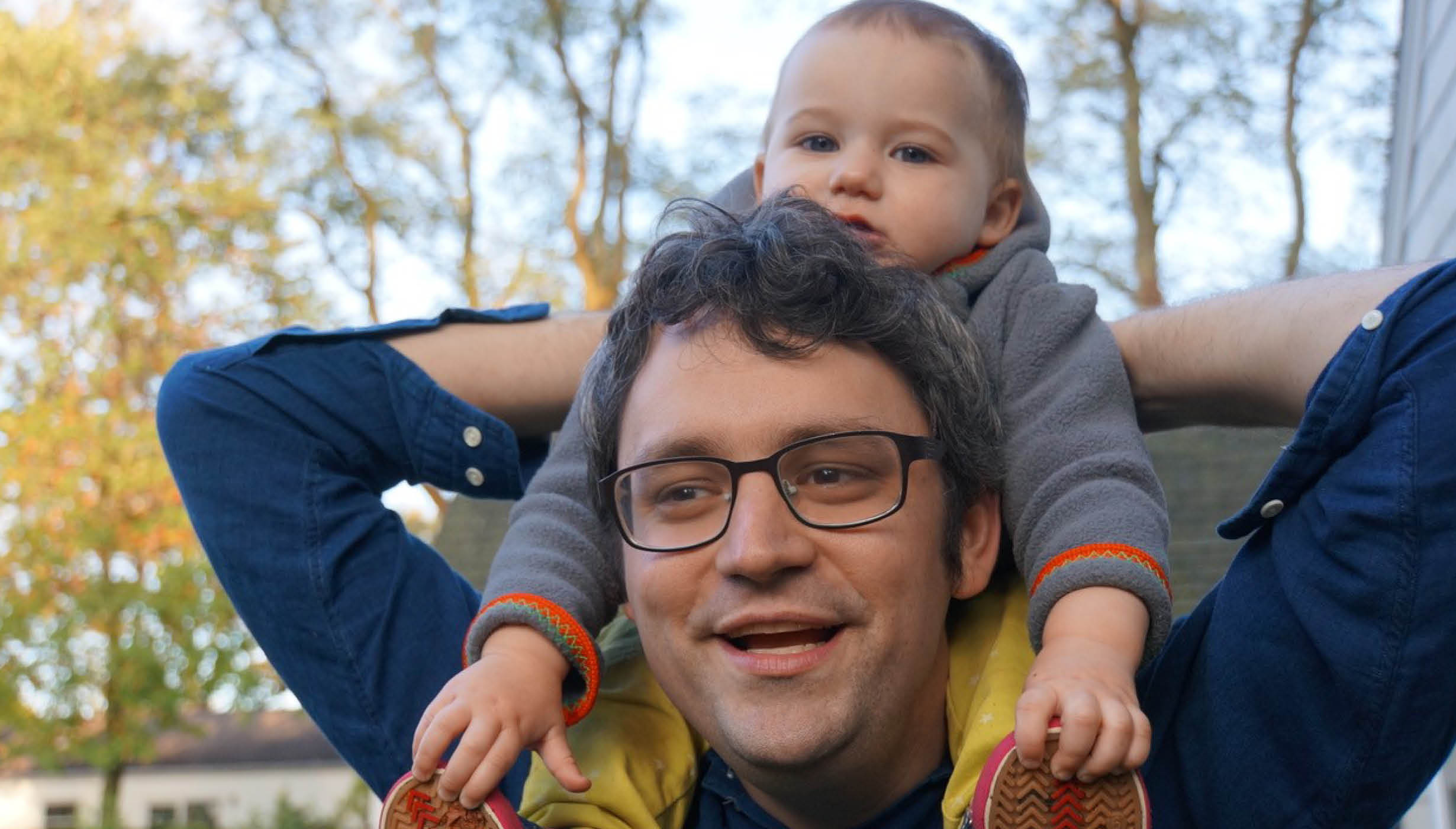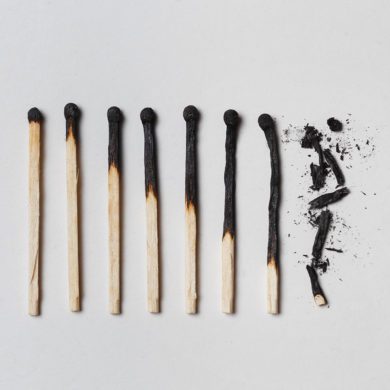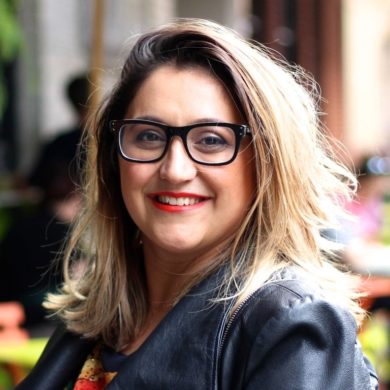The brick fell from an eighth-story windowsill on the Upper West Side of Manhattan. Greta was sitting on a bench out front with her grandmother. The two of them were chatting about a play they had seen together the night before. It was a live-action version of the kids’ show Chuggington, in which some talking train cars help their friend Koko get back on track after she derails.
“Koko got stuck!” Greta exclaimed over and over. The moment seemed lodged in her brain, my mother-in-law told us later. She was struck by the simplicity of the predicament, the profundity of the call for help. Reporters interviewed the aide of the elderly woman who lived on the floor — the woman whose windowsill crumbled. Even in print, I recognised the sickened wonder in her voice, her newly dawning understanding of the malevolence and chaos of the world: “It was like an evil force reached down …”
We left our tollway pass in the apartment. Stacy and I realise this only upon arriving at the mouth of the tunnel en route to the Weill Cornell ER. The gate fails to lift as we approach and we almost plow through it. The man at the tollbooth tries to reckon with us, incoherent and hysterical and blocking traffic.
“Our daughter’s been in a serious accident,” Stacy yells to him.
He peers behind us at the empty car seat, confused. “Where is she?” he demands.
“She’s with my mother!” Stacy says. Cars honk as the pressure of the line builds behind us.
“Please, she is in the hospital,” I interject. “Please just let us go.”
He waves us on. “Just don’t get in an accident!” he calls into our window as the bar lifts.
We’d received the phone call from Stacy’s mother, Susan, only 20 minutes before. “Oh, Jayson, it’s so horrible,” she had said — her first words. The scenario she described was still sketchy: There had been two chunks of brick; there were paramedics on the scene. Susan was in the back of a second ambulance, and Greta was in the first, already en route to the hospital. Susan had been struck as well, in the legs.
“Where is Greta?” I demanded.
“She’s up ahead,” Susan said. “She’s breathing on her own now. They told me she’s breathing on her own.”
Her voice was fuzzy, disoriented, and we heard other muffled voices, paramedics demanding things of her. A male voice cut in behind her, asked Susan something sharply. I could tell from her faltering response that she was struggling to connect the dots.
“Susan, please tell me,” I said, firmly and slowly. “Where did the brick hit Greta? Did it hit her in the head?” When I said the word head, I felt something break up my voice, an elemental thing I wasn’t familiar with yet.
“It hit her in the head, yes,” Susan said. I yelled this information over my shoulder to Stacy, who screamed instinctively.
“My baby girl,” she cried, sobbing convulsively. During the eternal drive up the highway, neither Stacy nor I speak in specifics. She reaches over and grabs my palm, her voice trembling. “She has to be okay. She just has to be. There’s no other option.”
***
We leave our car behind us in valet parking and run into the lobby. We reach the security guard, and I say it again, for the second time: “Our daughter’s been in an accident, and she’s in the ER.” I watch his face soften; I am already learning what happens when you tell people this news.
“I’m sorry,” he says, and waves us on.
There is a visible trail of crisis in the ER entryway, a smear on time leading all the way up the hall, and I feel us walking through it. I hear someone to my left ask, “Are these the parents?” and some part of me registers the grimness of that designation: “the parents.” Up ahead, a paramedic waves to us urgently.
We follow into a corner room with a table in the middle and doctors and nurses crowding around it. In the centre of it is Greta, stripped down to her diaper and pitifully tiny, her eyes closed and her mouth open. I watch as team members lift her arms and legs like she’s a sock puppet. I remember seeing the upper roof of her mouth, the pearly islands of her teeth. I have no memory of the injury on her head; my mind either refuses to note it or has erased it.
There are things you see with your body, not with your eyes. Stepping away, I feel something evaporate, a quantum of my soul, perhaps, burning up on contact. I am lighter, somehow immediately less me, as if some massive drill has bored into my bones, extracting marrow. I glance at Stacy, grey and motionless in a hallway chair, and see the same life force exiting her frame. Susan is on a stretcher down another hallway, out of our sight. We wait.
I take out my phone and call my parents, on vacation in New Orleans. I try my mother’s phone first: no answer. I leave a voicemail of some sort. I pace the length of the reception desk, try my father’s phone. Voicemail. My brother: voicemail. I have dropped through a wormhole, it seems, or fallen into a crack in time. My unaware family and friends are living above it. On their timeline, Greta is still fine.
There are things you see with your body, not with your eyes. Stepping away, I feel something evaporate, a quantum of my soul, perhaps, burning up on contact
It is John, my brother, who finally picks up. I try to relay the seriousness of the situation, and I can tell that he does not or is refusing to grasp it.
“Oh, Jay, I’m so sorry,” he says. His voice is sympathetic, the reaction to a commonplace childhood injury, a terrifying but temporary moment in any young parent’s life. “My heart goes out to you, man. There’s absolutely nothing worse. I remember when Ana” — his eight-year-old daughter — “was bitten by the dog. It was the worst day of my life. You feel so powerless.”
I try to emphasise my foreboding through the phone: “It’s bad, John,” I say.
“She’s going to be okay,” he tells me, and I hear a touch of a plea behind the reassurance in his voice. I don’t know very much yet. But I had seen the haunted looks on the EMTs’ faces when I entered, and I had already beheld the terrible sight of Greta’s body, lifeless and birdlike, lying limp on a massive table.
“No, John,” I say grimly. “No, I think she won’t.”
The trauma team rushes Greta from intake into another hallway to perform a CAT scan, which will reveal the depth and severity of her head injuries. All that precious stuff in her head — what state is it in? Stacy and I are already silently calculating odds. Greta began speaking in sentences startlingly early; she was obsessed with dogs, and Stacy and I joked that we would get her one when she was old enough to tell us “I want a puppy” in a sentence. When she told us that at 14 months, we laughed and expanded the minimum qualifications (“Mother, Father, I very much would like a dog, and I promise to help walk it and feed it”). We needed more time, we reasoned. We were sure we had it.
The CAT scan reveals a bleed in her brain, and she is rushed into emergency surgery. The bleed is so severe, apparently, that no one is dispatched to update “the parents” on her condition. After waiting an interminable-seeming amount of time in the ER, I seek out our social worker, a man whose face we had just been introduced to numbly minutes ago. He is holding a plastic bag, which he hands to Stacy: Greta’s gold sandals, stained with blood. Stacy accepts the bag without reaction and lets it dangle at her side. “Where is our daughter?” I ask.
The social worker knocks on the big blue door of the CAT-scan room, then tentatively pushes it open; it is empty save for one team member.
We are ushered to another floor. There we sit, waiting, texting friends and loved ones listlessly.
“Where is our daughter?” I ask
Our close friends Danny and Elizabeth show up, Elizabeth bearing a pendulous bag of sandwiches, in that helpless way you do when you can’t show up empty-handed but have nothing to give. Stacy had texted them when we were still in triage: “Greta’s been hurt and I don’t know if she’s going to be okay.”
Elizabeth sets the sandwich bag down on the floor and hugs us both wordlessly.
Stacy’s brother, Jack, and his girlfriend of nine years, Lesley, come next, their faces broken and streaming. They take their seats on either side of Stacy, who sits with her knees drawn up to her chest. I remember almost nothing from this moment, only the shape of the corner we sit in and then the dim figures of two police detectives standing near the elevators; they had arrived from the scene of the accident. The rest — how much time passes, what I say to Stacy or Jack, whether I get up to go to the bathroom, whether I text anyone the news, whether I say anything at all in particular — is a penny slipping beneath dark water.
I think about Greta, knowing that whatever of her that survives will be damaged. I imagine raising a shell of my child, a body that keeps growing while a mind flickers dimly. I think about never hearing her speak again. I think about wheelchairs, live-in care, an adult Greta prostrate and mute, occupying our spare bedroom. I think, briefly, about expenses — how would we shoulder that burden?
Eventually, the surgeon emerges. We stand up, pointlessly. He is the television-drama vision of a neurosurgeon: gaunt, grey, with hollowed eye sockets and some slight wasting at his temples. He seems to be made entirely of cartilage under his scrubs.
He lowers his bony frame into the chair next to us and clasps his hands between his knees. “I wish I had better news for you. We removed as much of her skull as we could to allow the brain to swell, but the bleed was rather severe.”
I feel him choosing his words as carefully and severely as possible: Our false hope is a blockage, and his job is to cut it out at the root and leave nothing behind to grow.
“So you’re saying that her recovering would be sort of … a miracle situation?” Stacy asks.
“I would say so, yes,” he answers. He looks at us, his eyes as sorrowful as his voice is laconic. He adds, more quietly, “This is one of those situations where I’d love to be wrong.”
We are sent down to another wing of the hospital, waiting for nurses to stabilise Greta. Susan is wheeled out in a hospital gown, her legs bruised and swollen and her face ashen. Her eyes are spent and wild, lost in the way I associate with patients deep in Alzheimer’s: There is something terribly wrong, the eyes say, but it is too large for me to figure it out.
She breaks into sobs the second she sees us, her body folding in the chair as if our gaze were shrivelling her. Stacy rushes over, kneeling down.
“It’s not your fault,” she says quietly to Susan. “It’s not your fault.”
Susan cries like a small child into her shoulder until she grows still.
I think about Greta… I think about never hearing her speak again
We all settle in and wait. There is a fish tank to our right, separating the hallway and the bustle of the hospital from us in our misery. The bag of sandwiches sits, unloved, on the table.
“Is anyone hungry?” Elizabeth finally asks, the question emerging like a puff of breath in frozen air.
Stacy pokes at the bag disinterestedly. “Maybe? Where are these sandwiches from?” Stacy’s food obsessions are so fierce and pure they sometimes disconcert even her, and their persistence in this situation makes us all chuckle slightly, despite ourselves.
“They are from Corrado, a really fancy specialty market,” Elizabeth says, adding with a smile, “We chose them very carefully. There’s dill chicken in there, and roast beef, and none of them have mayonnaise.”
Stacy brightens slightly, leaning forward. She opens the bag and begins to inspect each sandwich, lifting the lids on their cartons, pincering the top slice of bread with two fingers to peek beneath at the distribution of meat to cheese, to confirm mayonnaise absence, and to hunt for the dreaded presence of raw onion. As she performs this finicky little ritual, Elizabeth starts laughing; suddenly we all are.
“Mom, do you want one of these sandwiches?” Stacy asks, giggling and gasping a little. “They really are really good.”
We eat and then sit with the cartons strewn around, forgotten next to torn-open mustard packets and balled-up napkins. The silence settles back in, and as the grey haze of hours stretches on with no updates, the dread consumes us again.
We know Greta is going to die, all of us, although we haven’t allowed the thought into our conscious minds yet. None of us is ready for it to maraud through our subconscious, killing and burning everything it sees. But we hear the banging at the gates. We glance around us, realising this is the last we’ll ever see of the world as we’ve known it. Whatever comes next will raze everything to the ground.
Dr. Lee, the paediatric ICU doctor on call, comes out after three hours to retrieve us. She hits a button, the doors swish open, and we enter the PICU. This place will become our Bardo, our place of death and transition, for the next 48 hours. Our daughter is in a room on the left wing, but Dr. Lee guides us down the right wing instead, to a small room with a fake houseplant in the corner, and some granola bars on a coffee table surrounded by three chairs.
She sits and beholds us. Her eyes are grave, attentive, compassionate. “The unthinkable has happened to Greta,” she says by way of introduction. “Her condition is stable, but the brain injury is such that she will never wake up.” She waits a beat, then, more quietly, “I believe her prognosis is fatal.
“I want you to be aware,” she adds more gently as we sob, “that there is a lot of swelling. You should know that before going in to see her.” She sits and listens silently to the sound of our hearts splitting open in that room. Then she stands up: “Let me know when you are ready to go in.”
We walk into Greta’s room; we are, we now understand, greeting our dead child. Her face is yellow and glistening with IV fluid, her skull swollen and blue, with obscene steel staples running down the center. We flank the bed, each holding on to a hand.
“Hi, monkey,” my wife says. “We didn’t get very much time together. It wasn’t enough, was it?”
The staff, gathered at the edge of the bed, watches us quietly. One of them brushes a fingertip on Stacy’s wrist as she steps forward to adjust something: “You two are amazing,” she murmurs, then steps back. I can feel their tenderness toward us creeping into the room as our family shifts into focus: Greta is no longer a body they have spent fruitless hours trying to stabilise. She is ours, and we are hers.
We sing her lullabies as nurses tend to tubes. I almost snap a photo of her — I am a father, after all, and there is a certain logic to it. We had documented every new phase of her life, every outfit, every new playground or walk around the block, to preserve it, and in the haze of my grief, this feels no different. A nurse gently discourages me.
My parents are boarding a plane. After five attempts, my mother had finally picked up the phone; she had simply said, “No,” quietly and firmly, and began crying in the resigned way that you do when you sense a battle has already been lost.
We glance around us, realising this is the last we’ll ever see of the world as we’ve known it. Whatever comes next will raze everything to the ground
I check my phone at Greta’s bedside and see this: “Any updates? We’re about to board.” I stare at the message, unable to let them board the plane without news or to tell them my daughter is dead over text message. I simply respond, “The news is not good.”
My mother texts back, “We are profoundly sad,” and then they are in the air, cut off from communication and presumably as alone in their thoughts as we now are with ours.
We sit and watch the rise and fall of Greta’s lungs as the machine pumps and deflates them. In her first months of life, we had a nervous habit of checking to make sure she was still breathing. Sometimes, Stacy would pull her out of her bassinet at night to lay her on her chest, where their breathing would fall in sync.
The first time we took her outside, wrapped snug against Stacy in her baby carrier, we paused at a stoplight so Stacy could lift the flap and count breaths. A neighbour, a mother of a 3- and a 5-year-old, walked past: Stacy made a nervous joke, and the woman smiled in acknowledgment. “They’re always breathing,” she assured us.
Over the next months, we began to adjust to that reality. She’s always breathing, we told ourselves. Slowly, the part of us that we weren’t even aware we were holding taut slackened, one muscle fibre at a time.
I imagine it’s the same for all new parents: You slowly learn to believe in your child’s ongoing existence. Their future begins to take shape in your mind, and you fret over particulars. Will she make friends easily at preschool? Does she run around enough? Life remains precarious, full of illnesses that swoop in and level the whole family like a field of salted crops. There are beds to tumble from, chairs to run into, small chokeable toys to mind. But you no longer see death at every corner, merely challenges, an obstacle course you and your child are running, sometimes together and often at odds with each other.
I imagine it’s the same for all new parents: You slowly learn to believe in your child’s ongoing existence
By the age of two, your child is a person — she has opinions and fixed beliefs, preferences and tendencies, a group of friends and favourite foods. The three of you have inside jokes and shared understandings, and you speak in family shorthand. The part of you that used to keep calculating the odds of your child’s continued existence has mostly fallen dormant. It is no longer useful to you; it was never useful to the child; and there is so much in front of you to do.
What happens to this sense when your child is swiftly killed by a runaway piece of your everyday environment, at the exact moment you had given up thinking that something could take all of this away at any moment? What lesson do your nerve endings learn? Sitting at the foot of my daughter’s hospital bed, I am too numb to absorb any of this. But I will, soon.
Some riverlike coursing of hours slips past, in the time that is no time. Eventually, Dr. Lee calls us back into the other room to discuss next steps. “The way I see it,” she says, “we could take her off of life support now. Or,” and she pauses, “we could talk about organ donation.” She lets those words bloom and settle. Despite the severity of her head trauma, she continues, Greta’s organs have been miraculously preserved. Heart, liver, kidneys — all of them untouched, in perfect condition.
“If you decide to go that route, we will first have to go through responsiveness testing to confirm that she is brain-dead,” Dr. Lee says. “It is a formality,” she adds, cutting off our unspoken question: Is she? “We have seen no signs of responsiveness from Greta, but to begin our search for recipients, we must run a series of tests to certify brain death.”
Dr. Lee keeps talking for a moment, as I sit back and allow the idea to wash over me. She stands up. “I will leave you two to discuss it.”
Stacy and I sit alone. In retrospect, I don’t think either of us had a moment’s doubt. I am the writer, the over-explainer who strains to shut up so that others can avail themselves of oxygen. But it is Stacy who finds and speaks the words we need: “I need it to mean something,” she tells me. “Maybe this way, it won’t be for nothing.”
I nod. I do not know from what clear water source she is drawing, but I know that she has found her way directly to our truth for both of us.
We send immediately for Dr. Lee and tell her: We want to pursue organ donation. It is the only simple decision we make.
My parents arrive that evening and take their places with us. Together, we fan out like figures in a religious painting. My mother sits behind me on a windowsill. I am on the floor, my head resting on her knees in an echo of my childhood.
Susan is at the foot of Greta’s bed, weeping softly. “Why couldn’t it have been me,” she asks of no one in particular.
I glance up at her, and her heartbreak is so acute it is like the sun — I can’t look at it. No one answers, but I think at her: It shouldn’t have been you. It shouldn’t have been Greta. It should have been no one.
Stacy and I take turns sleeping at the foot of her bed. There are no dreams in trauma sleep: Exhaustion and shock are reliable copilots, seizing the controls when you most need them. Occasionally I repeat, out loud and with no apparent awareness of anyone listening, “I should just die. Why can’t I just die?” I lie down on the windowsill, telling my mother I do not know how to live.
“You had better not do anything stupid,” she responds gently.
I wander around the wing in my socks for the better part of the night, making 20 or 30 trips to the bathroom, sometimes only to pointlessly wash my hands and return to my daughter’s bedside. I hear my own howls of grief in the bathroom, the grey tiling covering the floor and the walls like a hyperbaric chamber, and think they must belong to someone else. I avoid my gaze in the mirror; I have no interest in learning what it feels like to meet my eyes.
No matter where I walk, I see empty hallways — no one in the waiting rooms, no other planned surgeries, no one in sight. This first night is the beginning of my reeducation: Earth is now an alien planet, and I am a visitor treading its surface. I graciously, passively accept the hug and words of a night nurse, her eyes welling with kindness, who urges me not to “give up” on our baby. The Lord Jesus, after all, works miracles.
In the morning I shower in the bathroom, changing into a pair of track pants and a T-shirt my mother has bought me from a nearby Gap. My brother arrives, haggard from a red-eye flight from Colorado. Liz, Stacy’s childhood best friend and sister in all but name, arrives from London. Stacy, delirious from exhaustion and trauma, murmurs instinctively, “How was your flight?”
Liz looks at her and begins laughing, her voice reassuringly vinegary through tears. “It was awesome, Stace,” she says wryly. “Just great.”
We catch everyone up as best we can. The doctors will arrive in a few hours to declare Greta brain dead. They will disconnect her briefly from the ventilator, monitoring closely for any signs of independent respiratory movement. They will test her brain-stem reflexes, the kind that register life at its most primitive. We emphasise, dully, that they do not expect to find anything.
I take my mother for a walk to the café downstairs. We are both restless souls, my mother and I, and we need some relief. I order a steam-flattened egg-and-cheese croissant and a cup of weak, bitter coffee with a red plastic stirrer. I place the croissant in the middle of the unfolded wrapper and pick the melted corners of the cheese off the edges. I wonder aloud what I will do after she is truly gone, once her body has been opened up, once we are out of the hospital without her.
There were days when I would drop off Greta at day care and feel myself glance longingly down the little hallway into the playroom; some part of me wanted to squat on the floor with her little friends all day, to abscond from the world of adults. Maybe I can volunteer at a co-op preschool for a while. Something to help fill the hole. I sip my coffee and feel the hollow of my stomach contract as it hits bottom.
My mother goes back upstairs without me, and I venture outside to the courtyard, gazing up at a stale grey sky. It’s May, but there are clouds and a damp chill in the air that hasn’t burned off yet. I call my dear friend Anna, a dancer who left the city for Ohio. She recounts to me later that I tell her, “We are going to have to find friends with dead children.” I have no recollection of uttering those words, but hearing them again months later it strikes me: Even then, some small part of me was making long-term plans for survival.
***
Ever since the accident, I have avoided going to the park. The park was our place, Greta’s and mine — every tree, every leaf, every passing doggy belonged to the two of us. Even within my cocoon of shock, I am sure going there would pierce my defences, flooding me the way my first trip outside did after she died.
And then, one day, just as the summer light is beginning to change, I wake up with a familiar itch. I need to go running in the park.
I step outside and feel only the warmth of the sun. I round the corner on the block that leads to the parade grounds, just outside the park’s southwest entrance. The street is wide, quiet, shaded. There is no one outside, no one to nod at, make eye contact with, step around.
I enter the parade grounds and run past fields full of children, my eyes fixed straight ahead. To my left, a middle-school football team is doing speed and endurance drills, dancing frantically on their toes and dropping down for push-ups. Two boys swing a bat lazily to my right, smacking a baseball into the same bulged-out spot on the chain-link. It hits the fence with a loud bong as I run past, but I do not flinch. I reach the edge of the park, tennis courts to my right.
There at the park’s mouth, my heart stirs, and I feel a peculiar elation. I recognise her. Greta is somewhere nearby. I feel her energy, playfully expectant. Come find me, Daddy, she says. Tears spring and run freely down my face. I hear you, baby girl, I whisper. Daddy’s coming to get you.
Elated, I enter the park and immediately spot her; she is waiting for me, hiding behind the big tree in the clearing between the Vanderbilt playground and the duck pond. She appears from behind the tree with a flourish, giggling, just like in our old game: She would run out into the hallway from the bedroom where we had been playing, either naked or in her diaper, and cast me an impish look, asking, “Where’s Greta?” I would feign great perplexity, turning over small toys on the floor to see if she was under them, peeking behind the couch, clutching my head in mock terror. “Oh no, what have we done?” I would moan. “We’ve lost her!” She would laugh, run back in, and announce, “Greta came right back!”
Standing in the park, staring at her, I make a strange and primal sound, deep and rich like a belly laugh, hard and sharp like a sob. You are here. You picked the park. Good choice, baby girl. Oblivious to the people around me, I run to her. She wiggles in anticipatory joy. Stooping down, I scoop her up under her soft armpits, her shoulder blades meeting at the pads of my fingers, and I lift her up into the sky. She is invisible to passersby — to them, there is nothing in the spot next to the tree where she stands laughing and clapping but a patch of grass, and there is nothing in my arms but air. But she is not here for them; she is here for me.
She gazes down at me, her smile that turned crooked at the bottom like mine crumpling her wide-open face. I bend my arms and lower her face down to mine and kiss her, slowly. Then I set her back down in the grass.
You stay here, okay? I say. Daddy’s going for a run, okay, sweetie pie?
Oh yeah, okay! she says back.
I turn around and begin running hard along the perimeter of the pond, where we had dipped her hand in the water, splashing and saying, “Here we go, ducks! Here we go!” The playground recedes behind me, where I had pushed her on the swing while she sang, “Poopy, poopy, poopy poopy,” to the tune of “Twinkle, Twinkle, Little Star” at the top of her lungs. “If my kid’s saying ‘poopy’ tonight,” the mother next to me deadpanned, “I’ll know where he picked it up.”
I feel her presence filling up my heart, and with it comes a strange exhilaration that I have felt often in the weeks after her death. Grief at its peak has a terrible beauty to it, a blinding fission of every emotion. The world is charged with significance, with meaning, and the world around you, normally so solid and implacable, suddenly looks thin, translucent. I feel like I’ve discovered an opening. I don’t know quite what’s behind it yet. But it is there.
I am treading ether, a new and unfamiliar kind of contact high. I have been raised secular by my parents, and I’ve never set foot in a church for more than an hour. But I will do anything for Greta, I am learning. And that includes becoming a mystic, so that I might still enjoy her company.
When I reach the edge of the park again, I stop and feel a torrent of words flood me. I grope for my phone, blindly choosing the most recent document, a mess of to-dos and grocery lists. Underneath a reminder to pick up pita and above a confirmation number for a UPS delivery, I write, “There will be more light upon this earth for me.”

This is an edited extract from Once More We Saw Stars by Jayson Greene, published by Hachette Australia, $32.99 Trade Paperback.














No Comments